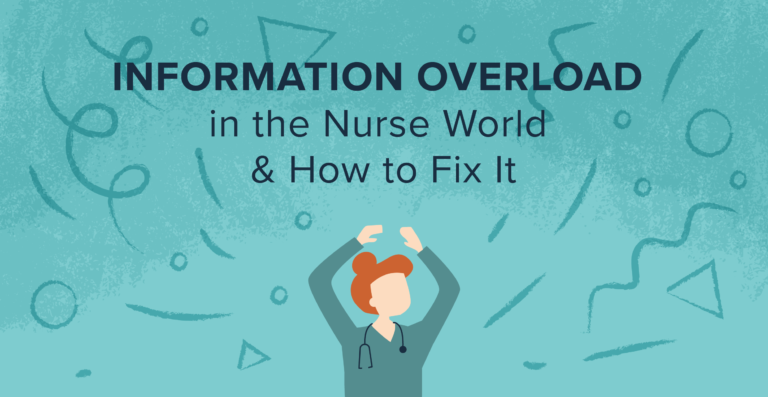Any nurse will tell you about the “alarm fatigue” and “noise” they experience while working bedside. It’s nearly constant, and the risk is we become deaf to it and miss important alarms that do need our attention. It’s like having train tracks near your house; over time you end up not hearing the trains at all, but with healthcare, the implications of missing alarms are much more dangerous.
On top of all of this, there is another form of “noise” that nurses are subject to on a weekly basis. Healthcare management is notorious for overloading staff with too much information, diluting information that truly is important. Here is a list of ways in which management overwhelms staff with information—including tips to address them.
1. Massive Update Emails: Nurses are used to receiving too many emails at work, but it’s usually the management emails that are the most tiresome. Often, they’ll contain a slew of updates, policy changes, reminders, kudos, tsk-tsks, and hospital-wide announcements. To prevent information from being missed, words are bolded, ALL CAPPED, underlined, changed to a different color, or yellow text highlighted. When everything is emphasized, nothing is emphasized, and the actual important information won’t be retained.
- Tip: Limit emails to 3 important takeaways, provide them in bullet point format and briefly reinforce those points during Huddle. Lose all the formatting tricks; they’re not working. Stick to the issues that require immediate knowledge. If there is other information that needs to be shared, save it for the monthly staff meeting.
2. Walls Covered in Flyers: Want to know how desperate management is to get their message out? Look inside the staff bathroom. Those few moments of silence are seen as golden opportunities by Management to communicate out just one more “urgent” issue. But the only thing that feels urgent at that moment has nothing to do with what’s written on the flyer.
- Tip: Consolidate all flyers to a bulletin board, just don’t expect any of that information to be retained. It should be optional, and if possible, fun! If something is important, don’t put it on a flyer. This might take some soul searching about what constitutes as “urgent and important” information.
3. Phone Calls & Texts to Work Extra: If nurses are annoyed at Management’s “Bathroom Bulletins” (they are) then they’ll probably like even less having their phone blow up on their days off with pleas from their boss to work extra. First of all, the response rates are abysmal. Nurses know who’s calling and texting and would rather ignore it than try to come up with an excuse for why they don’t want to work extra. For many nurses, these phone calls happen every single day. And text messaging should be saved for family, friends, and optional opt-ins, not work updates. If you rely on text messages to communicate with your staff while they are not at work, you’re failing to communicate properly and are likely just adding to the noise.
- Tip: Invest in modern communication solutions designed specifically for healthcare. Consolidate your communication to a few methods, and avoid wading into their time at home. If you truly are desperate to fill short term staffing holes, then you’ll know how important it is to invest in solutions that will improve your response rates while simultaneously boosting staff satisfaction. Yes, these actually exist.
Nurse Managers need to find more effective ways to communicate with their staff. It’s hard enough being a nurse and dealing with sick patients all day. We should avoid forcing them to take in too much information, especially information that is not urgent. By staying more focused on what actually needs to be passed along and consolidating the ways in which it is communicated, your staff will absorb more information with half the annoyance.
